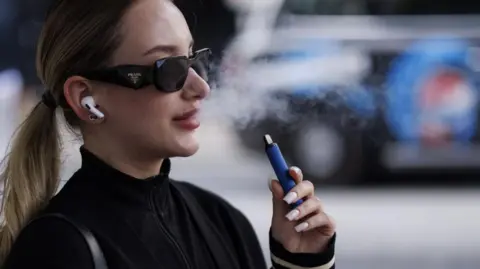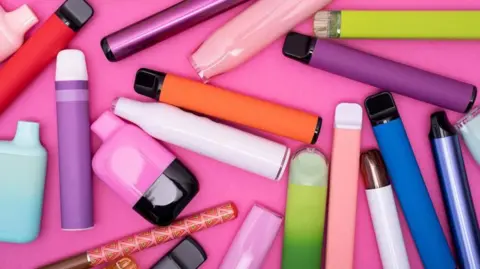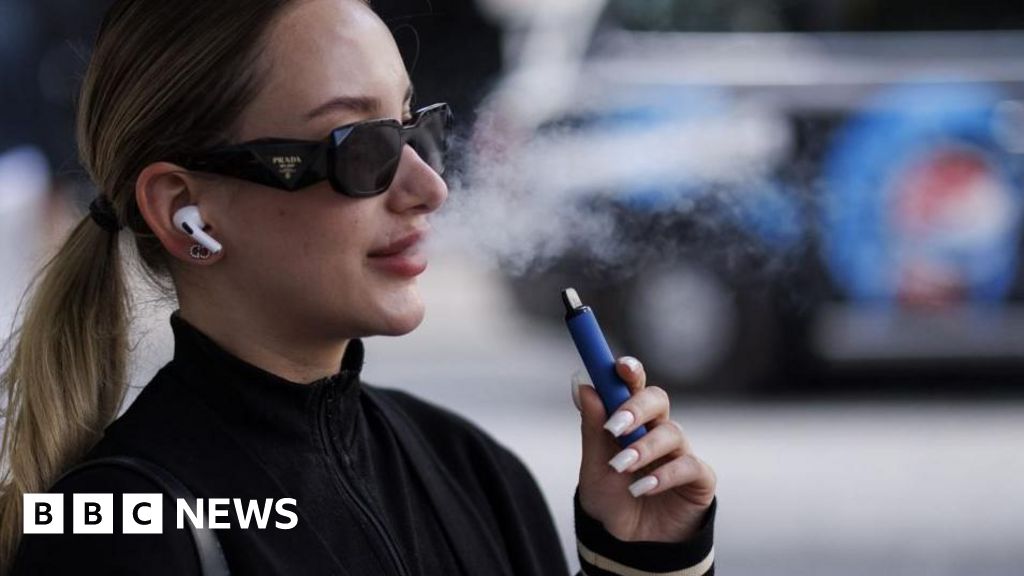 EPA-EFE/REX/Shutterstock
EPA-EFE/REX/ShutterstockThe sale of single-use disposable vapes will be banned in England and Wales from June next year, the government has confirmed.
Ministers in England said the move, first announced in January by the previous government but not enacted before the general election, is intended to protect children’s health and prevent environmental damage.
The government said it had worked closely with the devolved nations and they would “align coming into force dates” on bans, with Wales already confirming it will follow suit.
Vaping industry leaders have warned the move could fuel a rise in illegal sales of the products.
Single-use vapes had been due to be banned in Scotland from April of next year – but the Scottish government has said the ban will now be delayed until 1 June to align with England and Wales.
The Department for Environment, Food, and Rural Affairs (Defra) said vape usage in England had grown by more than 400% between 2012 and 2023, with 9% of the British public now buying and using the products.
The number of people who vape without ever having smoked has also increased considerably over recent years, driven mostly by young adults.
It is illegal to sell any vape to anyone under 18, but disposable vapes – often sold in smaller, more colourful packaging than refillable ones – are a “key driver behind the alarming rise in youth vaping”, the previous government said when it first set out its plan.
Public health minister Andrew Gwynne said banning disposables would “reduce the appeal of vapes to children and keep them out of the hands of vulnerable young people”.
Vaping is substantially less harmful than smoking, but it has not been around for long enough for its long-term risks to be known, according to the NHS.
 Getty Images
Getty ImagesThe ban will not apply to rechargeable or refillable devices.
Single-use vapes are difficult to recycle and typically end up in landfill, where their batteries can leak harmful waste like battery acid, lithium, and mercury into the environment, the government said.
Batteries thrown into household waste also cause hundreds of fires in bin lorries and waste-processing centres every year.
Defra estimates almost five million single-use vapes were either littered or thrown into general waste each week last year, a nearly four-fold increase on the year before.
In 2022, vapes were discarded containing a total of more than 40 tonnes of lithium, enough to power 5,000 electric vehicles, it said.
Defra minister Mary Creagh, whose role focuses on reducing waste in the economy, said disposable vapes were “extremely wasteful and blight our towns and cities”.
Paediatric respiratory consultant Dr Claire Hogg told BBC Radio 5 Live that disposables had “lead to an absolute epidemic of nicotine addiction and a group of children… who are having disrupted sleep, disrupted concentration and really struggling with problems with addiction”.
She said her son had previously vaped and thought the ban was “brilliant news” as he had been “addicted to nicotine through false marketing” since he was around 14-years-old.
Disposable vapes – often priced at about £5 – are usually cheaper upfront than many refillable vape kits – often priced at about £8-12 – and can be bought from non-specialist retailers.
But the long-term costs associated with refillable kits are lower than for disposables.
Ireland and Belgium have recently outlined plans to ban the products, while countries including New Zealand, Australia, South Korea, India and Brazil already have restrictions in place.
‘Black market’
John Dunne, director general of the UK Vaping Industry Association, told BBC Radio 4’s Today programme that a ban would “fuel” illegal sales.
“We have a black market in vaping products already that the authorities can’t really keep up [with], so now this is going to be dropped right on their lap as well,” he said.
Mr Dunne said the association had called on the government to alternatively introduce a licensing scheme for retailers and distributors of the products, “which will include things like mandatory age verification processes”.
The government plans to introduce legislation to ban the sale of single-use vapes from 1 June 2025, allowing retailers time to sell their remaining stock. It will cover all single-use vapes, regardless of where they are imported from.
Online shops and major retailing platforms will be expected to use “online takedown procedures” to stop illicit suppliers when the ban comes into force, the department for health and social care said.
The devolved governments have previously announced an intention to bring in similar bans, and the UK government said it was working with them to align the dates on which the bans come into force.
Welsh Deputy First Minister Huw Irranca-Davies said introducing the bans on the same date across the nations would enable “high levels of compliance and consistent approach to enforcement across the UK”.
The measure is separate from government plans to end smoking by banning the sale of cigarettes to anyone born after January 2009.
Health Secretary Wes Streeting said on Monday a bill to enact that ban would be introduced to parliament before Christmas.



